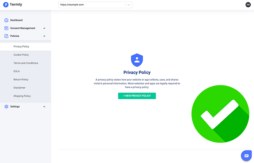A true relic on the World Wide Web, Blogger, a free-to-use website hosting service, has been helping people easily create blogs, portfolios, photography websites, and even small ecommerce stores since 1999.
However, because Google owns Blogger, your use of the service is subject to their Terms of Use and Privacy Policy.
No matter what type of site you create with it, if you use certain internet cookies or collect personal information from your visitors, you need to protect their data by implementing a privacy policy that adheres to privacy laws and any applicable third-party requirements.
How can you do this? Below, I’ll explain why you need a privacy policy for Blogger and teach you how to create one that’s legally compliant.
How To Make a Blogger Privacy Policy
I’ll discuss three different ways to make your Blogger privacy policy below.
Managed Solution
Honestly, the best way to make a privacy policy for your Blogger website is to use a managed solution, like our Privacy Policy Generator.
It’s super easy, quick to use, and helps you comply with several of the most prominent data protection laws worldwide.
All you need to do is answer some questions about your business and data processing activities, and it creates a comprehensive privacy policy that you can embed directly onto your Blogger site.
Below, see an example of one of the questions it asks.
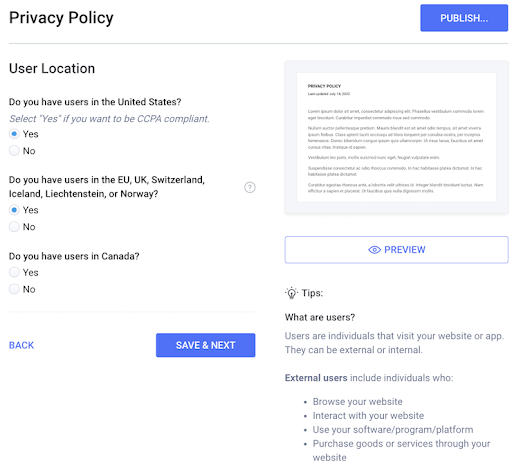
Template
You can also use our free privacy policy template to make one of these documents for your Blogger website.
Templates are a good option but they take more work and time than a managed solution. You’ll have to manually fill in the blank sections with details about your business.
Termly’s free template features several necessary clauses to help you comply with different data protection laws from around the globe.
See a sample of what it looks like below.
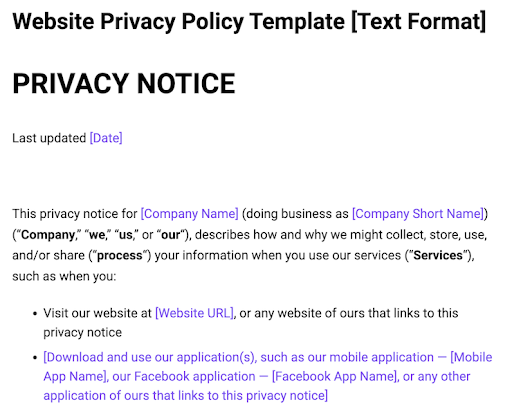
DIY
Finally, you might consider taking the DIY approach and writing a privacy policy on your own.
However, this option is only recommended if you plan on having a lawyer check it for you or have extensive knowledge about data privacy regulations.
New laws enter into force regularly, and old ones often get amended. If you forget to update your policy or leave something out, even by mistake, you’ll still be held accountable.
If you decide to use this method, be extra mindful and double-check your policy. To help you out, here’s a helpful guide explaining how to write a privacy policy.
What Is a Privacy Policy for Blogger?
Like privacy policies for any website, a privacy policy for Blogger is a statement that outlines how your blog collects, uses and shares personal information from your visitors.
If your Blogger website falls under a data protection law, you must post a privacy policy that meets all requirements outlined by those pieces of legislation. While these laws require slightly different specificities, privacy policies should explain:
- What personal data you collect
- How you use the personal data
- If you share the data with any third parties
- The rights users have over their personal data
- Your company contact information
Does Blogger Require a Privacy Policy?
Blogger itself doesn’t require you to post a privacy policy, as the platform is considered a social media tool. However, because it’s subject to Google’s Terms of Use, using Blogger means you agree to post a compliant privacy policy if your website falls under any data privacy laws.
The highlighted text in the screenshot below shows Google’s exact expectations.
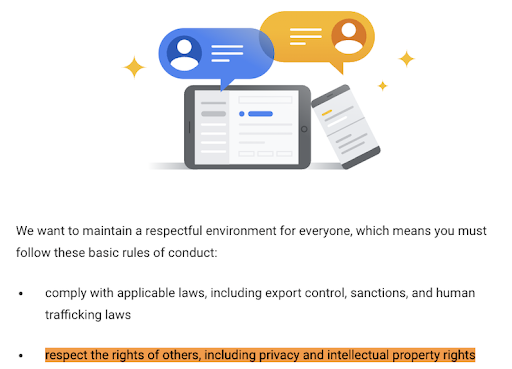
So, if your Blogger site collects personal information, uses any types of internet cookies, and falls under applicable data protection laws, it needs a compliant privacy policy.
Otherwise, Blogger may terminate your site use, and you could face fines and other penalties for violating the law.
Along with your privacy policy, your website may need a blog disclaimer if you engage in certain activities like sponsorships or affiliate linking.
Why Would I Need a Privacy Policy for My Blogger Site?
There are several reasons why you might need a privacy policy for your Blogger-hosted site. From legal compliance to meeting customer expectations, let’s discuss why this document is essential in the following sections.
You Monetize Your Blog or Use Internet Cookies
Your blogger site may need a privacy policy if you monetize it through ads or affiliate links.
This requirement is especially true if you use services like Google AdSense or Analytics, as some privacy laws give individuals the right to know that websites are collecting their data in this way and provide a way for them to opt out of targeted ads and other tracking technologies.
These services also rely on internet cookies, which are subject to data protection laws as they are stored on a user’s device to collect certain personal data.
Regarding affiliate links, your privacy policy should outline your site’s relationship with third-party services and their data-handling practices.
Don’t forget to include an affiliate disclosure to notify users that you get compensated by companies for mentioning or linking to their products on your Blogger site.
A Privacy Policy Is Legally Required
You’ll need a privacy policy if your Blogger site falls under any data privacy laws.
These laws can and often do impact business outside of the regions where they originate, so you may fall under the scope of one or more of them.
To help you, I put a table describing the legal thresholds for some of the most significant data privacy laws worldwide. Take note of any that apply to you.
| Data Privacy Law | Legal Threshold |
| General Data Protection Regulation (GDPR) | Any organization that collects, processes, or stores the personal data of individuals located in the European Union (EU) or European Economic Area (EEA). |
| The Data Protection Act (UK GDPR) | Any organization offering goods or services to UK citizens that processes their personal data. |
| Amended California Consumer Privacy Rights Act (CCPA/CPRA) | For-profit entities that do business in California and meet one of the following:
|
| California Online Privacy Protection Act (CalOPPA) | Any website with California visitors falls under the threshold of this law. |
| Virginia Consumer Data Privacy Act (VCDPA) | Entities doing business in Virginia or targeting Virginia residents who meet one of the following:
|
| Connecticut Data Protection Act (CTDPA) | Any data controller or processor who conducts business in Connecticut or produces products or services targeted at Connecticut consumers and any controller or processor who meets one or more of the following:
|
| Colorado Privacy Act (CPA) | Controllers that conduct business in Colorado or who produce or deliver commercial products intentionally targeted to Colorado residents that meet one (or both) of the following:
|
| Children’s Online Privacy Protection Act (COPPA) | Any website or online service that is directed at children under 13 that:
|
| Personal Information Protection and Electronic Documents Act (PIPEDA) | Any organization that collects and uses personal information in connection with commercial activities, including selling or sharing donors, membership, or fundraising lists, falls under PIPEDA. |
| Australia’s Privacy Act of 1988 | Any Australian government entities or organizations that have annual gross revenue of AUD $3 million and small businesses that make less than AUD $3 million who meet any of the following:
|
| New Zealand’s Privacy Act of 2020 | Any New Zealand individual, organization, or business in the public or private sector that collects and holds personal information about other people.
Any overseas individual, organization or business carrying business in New Zealand that collects and holds personal information about other people |
| South Africa’s Protection of Personal Information Act (PoPIA) | Any entity registered to South Africa that processes personal data or people from any location.
And any entities located outside of the country who outsource their data processing to South Africa. |
Third-Party Services Require a Privacy Policy
You might also need a Blogger privacy policy if you use any third-party services, as these entities commonly require one in their Terms of Use agreements.
For example, if you use Google AdSense to show ads on your blog, you must agree with AdSense’s Terms of Service — which require your website to have a “clearly labeled and easily accessible” privacy policy, as shown below.

So whenever you add third-party services to your Blogger site, always check their terms of service to ensure you comply with their privacy guidelines.
Users Expect a Privacy Policy
Data privacy is a prominent global issue, and these days, users expect to find a privacy policy somewhere on your Blogger site.
The modern website visitor wants to know if you collect their personal data and what you do with it. If people can’t easily find a privacy policy in the footer of your Blogger blog, they may assume your site is insecure.
Even if a privacy policy is not legally required, adding one will reassure readers that you take their privacy seriously.
What Goes Into a Blogger Privacy Policy?
Technically, the specific clauses you must include in your Blogger privacy policy depend on which laws apply to you.
But below, I’ve summarized the most common clauses relevant to Blogger websites.
What Personal Data You Collect
Every privacy law requires you to inform users about what personal data you collect and process from them, so describe this information in a clause in your Blogger privacy policy.
You might organize it as a bullet list, put it in a table, or write short paragraphs that are easy to read and understand.
Throughout this section, I will use examples from the privacy policy for the Gasparilla Invitational, a Blogger-hosted website.
See their clause covering the data they collect in the screenshot below.
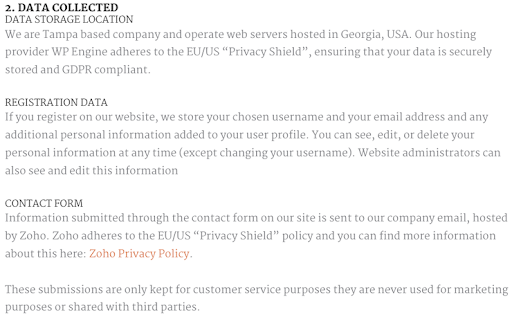
How and Why You Use the Data
Laws like the GDPR require you to explain why and how you use the data you collect, and on which legal ground.
Clearly explain these details in a clause directly in your Blogger site’s privacy policy. This is another great place to use tables or bullet lists to organize the information in a digestible way.
In the sample below, see how the Gasparilla Invitational Blogger website phrases this clause in their privacy policy.
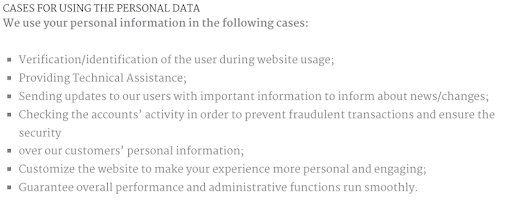
If You Share the Data With Third Parties
If any third party can access your users’ data, you must disclose it in your privacy policy.
You’ll need this clause if you use Google AdSense or Analytics or if your site lets people log in or connect to it with their social media or other third-party APIs, like Facebook.
Below, read how the Gasparilla Invitational privacy policy phrases this clause.
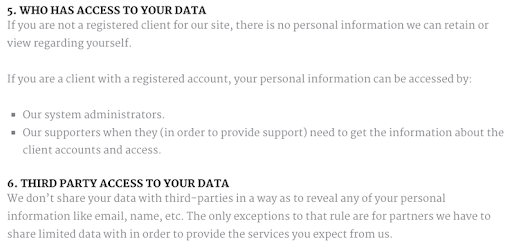
If You Use Cookies or Other Trackers
Because the data cookies collect qualify as personal information under data privacy laws, you should include a clause explaining which ones your Blogger site uses and how users can control them in your privacy policy.
Blogger does allow you to put cookies on users’ browsers, especially if you set up Google AdSense or Analytics.
See another Gasparilla Invitational privacy policy example below.
![]()
Description of Consumer Privacy Rights
Laws like the GDPR, the CCPA, the VCDPA, and others require you to explain users’ rights over their personal information and how they can act on those rights. So, put these details in a clause directly in your privacy policy.
If multiple laws impact your blog, consider creating different clauses for each user location so it’s easier for people to find the proper information.
Below, see how Gasparilla Invitational writes this clause in their Blogger privacy policy.
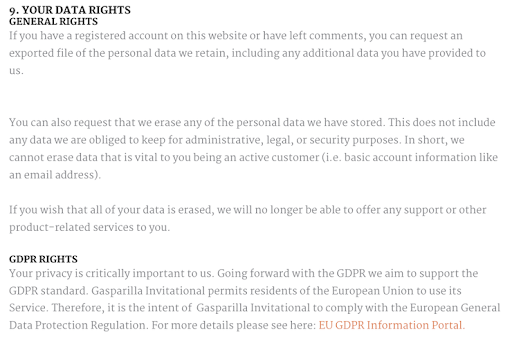
Data Retention Policy
Under regulations like the GDPR, you must explain your data retention practices in your privacy policy and only store the information for as long as necessary to achieve the original purpose you stated for collecting it in the first place.
You can see how Gasparilla Invitational words this clause in the example below.

Contact Information
Several data privacy laws obligate you to include proper contact information in your privacy policy so users can reach you if they have questions or concerns about your procedures.
Consider an email address, phone number, physical address, or any combination of these.
Gasparilla Invitational keeps this information in the footer of their website, which is visible on their Blogspot privacy policy page, shown below.

Examples of Blogger Privacy Policies in the Wild
Next, let’s look at a good example of a Blogger privacy policy to help you get some ideas for writing and formatting your own.
Women Managing the Farm Blogger Privacy Policy
Let’s look at the privacy policy from the blog Women Managing the Farm, hosted on Blogger.
They put a link to their policy directly in the footer of their site, so it’s always accessible no matter what page you end up on.
This site’s privacy policy also does a good job explaining what information they collect. See a sample of this clause below.
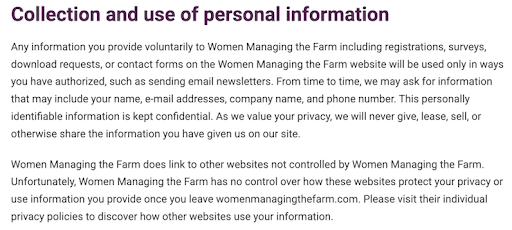
The Women Managing the Farm privacy policy also features a clause covering their use of cookies, which complies with data privacy laws like the CCPA.
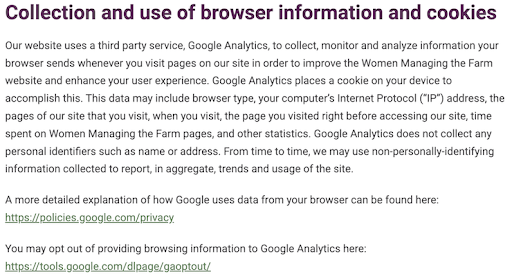
They also include links to help their users opt out of targeted ads, which is necessary under laws like the GDPR and the CCPA. Check it out below.

Like the Women Managing the Farm Blogger site, ensure your privacy policy clearly and accurately explains all of your data processing activities and provides a way for your users to act on their privacy rights.
Summary
You now know when and why you need a privacy policy for Blogger websites.
Remember, a privacy policy outlines how you collect and use personal information from your website visitors. Although Blogger doesn’t necessarily require one, many laws around the globe do, and they may apply to your blog.
Plus, even if a privacy policy isn’t legally required, third-party services often require one, and users expect one. Since adding a privacy policy to your Blogger blog is easy and free, there’s no reason not to have one.


